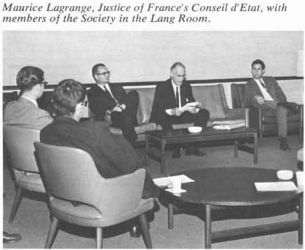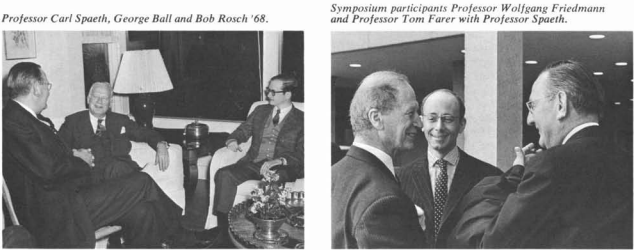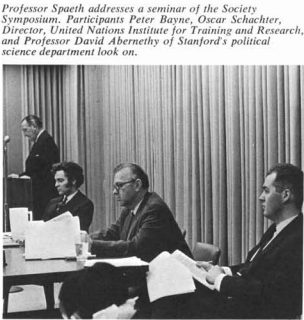The International Society
Among the productive experiences open to students in legal education at Stanford Law School is membership in the International Society. Extracurricular in the strict sense, active membership is for most participants a rewarding academic exercise.
The theme for the Society’s 1967-68 academic year program is “Foreign Intervention in Civil Strife.” Under Society President Robert Rosch ’68 the year’s activities were inaugurated at a banquet in October at which over 200 guests heard Dean Manning speak on United States intervention in Cuba.
Society Vice-President Lon Allen ’68 ha been responsible for a number of subsequent programs this year, including an off-the-record coffee hour with Under Secretary of State Nicholas Katzenbach and a discussion with Theodore Draper, American journalist and author of The Abuse of Power. Katzenbach’s discussion centered on questions of foreign policy in Vietnam as well as in other underdeveloped nations, Draper’s with questions of intervention in the Middle East. Justice Maurice Lagrange, of France’s Conseil d’Etat, discussed with students the French administrative court system and John Mills, South African counsuI stationed in San Francisco, spoke on aspects of the United States’ intervention in the Dominican Republic.
In December a three-man panel discussion on the Hungarian Revolution of 1956 was held under the Society’s auspices. Participants were: Dr. Andrew Janos, professor of history at the University of California at Berkeley; Dr. Ivo Lederer, Stanford professor of history; Dr. Marc Mancall, assistant professor of history at Stanford. Ron Romines ’69 moderated the panel. A reception followed at the home of Professor Carl Spaeth, where a first-year student, Adam von Dioseghy, told of his personal experiences as a student freedom fighter during the revolution in Budapest.
On February 28 former Under Secretary of State George Ball was the special guest at a dinner hosted by Mr. Spaeth. The dinner was followed by an informal reception at which Mr. Ball met and talked with International Society members.
The Society maintains a tradition of sponsoring the Stanford Law School participation in the nationwide Philip Jessup Moot Court Competition, in which students who successfully argue a problem in international law at their home schools participate first in regional finals and then in national finals in Washington, D.C. This year Chuck Mansfield ’68 directed the Competition, which was held at Stanford in February. At the regional finals in San Francisco March 28 the three Stanford representatives, James Amschler ’68 Joseph Dennin ’68 and Ricardo Ferrari ’68 took first place. Ferrari was also named best oralist in the Competition. The problem for debate was set forth by Professor Dale Collinson. The team argued in the finals in April for the national championship, but did not take first-prize honors.
Again following an annual tradition, the Society undertook sponsorship of a three-day symposium on March 13-15. The program was in keeping with the year’s theme of foreign intervention in civil strife. Participants included David Abernethy, Stanford professor of political science, Richard A. Falk, Princeton professor, Woodrow Wilson School of Public and International Affairs, Tom Farer Columbia University professor of law, Wolfgang Friedmann, Columbia University professor of law and Professors Spaeth and Ehrlich from Stanford School of Law.

The symposium, directed by Symposium Vice President Frank Katz ’68, took up the questions of general policy of intervention, with particular attention to events in Rhodesia, South Africa and Vietnam. One afternoon was devoted to seminars of ten students each led by members of the guest panels.
The Society plans to publish the proceedings of the symposium as it has done in the last two years, but this year’s proceedings will appear as the Stanford Journal of International Studies. The Journal will be roughly patterned in format and style after the Stanford Law Review. According to Richard Anderman ’68, who is in charge of the forthcoming publication:
. . . in light of the greatly increased activity of the International Society and the growing interest in international law within the student body, the Society proposes to terminate the Proceedings and to establish in its place the Stanford Journal of International Studies as a regular publication. The Journal will appear annually at first. It is anticipated that the number of issues per year will be increased as warranted by demonstrated interest and capacity for quality workmanship.
The Journal represents a bold new effort by Stanford law students. We are dedicated to producing a high caliber publication. The potential rewards are great.
Currently active members of the Society see in this new venture an added opportunity within the School for students to participate in the editorial process and to prepare articles, notes and book reviews for publication. They also see it as a new outlet for the publication of the growing volume of Stanford scholarship in the international field in general.
In 1966-67 the activities of the Society were geared to the theme of economic aid to developing nations. Dean Manning addressed the first banquet of the year in October. In late October Mr. Murray Belman, assistant legal adviser to the Secretary of State for Economic Affairs, spoke at the second banquet on the role of economic agreements in United States foreign policy. Malaysian Ambassador Tan Sri Ong Yoke Lin was the Society’s guest for a round of informal meetings with law students and was the main speaker for the third banquet of the year. Other special guests of the School under the Society’s auspices were: Hon. Charles Runyon III, assistant legal adviser for African affairs, Department of State; Radomiro Tomic, Ambassador from Chile to the United States; Vasco Leitao de Cuñha, Ambassador from Brazil to the United States.

The January banquet, fourth in the year’s series, had as its main speaker Sukich Nimmanheminda, Ambassador from Thailand to the United States.
In February Avraham Harman, Ambassador from Israel to the United States, visited the School for a day and held an informal seminar with students in the evening. In March the Society sponsored the qualifying rounds for the Law School s participation in the nationwide Philip Jessup International Moot Court Competition.
Last April, during the yearly meeting of the American Association of International Societies, Charles
Mansfield ’68, the Society’s executive vice-president, was elected president of the Association of Student International Law Societies, the first person from the western United States to hold this office.
The most extensive project on the 1966-67 calendar, a three-day symposium on the theme of foreign aid to emerging nations, was held at Stanford on March 1-3, 1967. The Graduate School of Business shared sponsorship of the series; faculty advisers were Professors Thomas Ehrlich of the Law School and Gerald Meier of the Business School faculty, who also instructs at the Law School. Among the participants were: Dr. Hans Singer, director of the Policies and Programming Division of the United Nations Organization for Industrial Development; Mr. Kenneth R. Hansen, vice-president of Syntex Corporation; Professor Hollis Chenery of the economic department of Harvard University; Mr. Thomas Farmer, general counsel for the Agency for International Development; Vasco Leitao da Cuñha, Ambassador from Brazil to the United States; Professor T. N. Srinivasan of the Indian Statistical Institute, New Delhi; Mr. Joseph Gold, general counsel of the International Monetary Fund; Professor Lorie Tarshis of the economics department of Stanford University; Mr. Lawrence F. Ebb, counsel for General Electric International; Professor Richard M. Buxbaum of the School of Law, University of California, Berkeley; Professor Kenneth W. Dam of the University of Chicago Law School; Professor David B. Abernethy of the Stanford political science department; Professor Gerald Meier of the Stanford Graduate School of Business; Professor Thomas Ehrlich of the Stanford School of Law. The Society’s 1966-67 year ended with a banquet at which Hugo Margain, Ambassador from Mexico to the United States, was the keynote speaker.
The International Society presents a bold challenge to its members and to the entire Stanford academic community as well. It draws support and audiences from a wide selection of interest groups on the campus. In light of its activities in the past two years alone, it is not difficult to accept Bob Rosch’s statement that fully half of the Law School’s students will participate in International Society programs at some time during their three years at Stanford.

